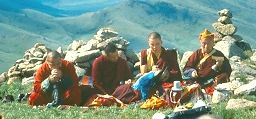In the village of Altanbulag a dairy factory was built with financial help of the Dutch government and in another village, Bayankhangai, yoghurt is being produced. There is also a preventive medical and hygienic programme for children and the herdsman families.
In three villages special skill training centres for women have been set up; with the acquired skills the women will be able to start small businesses of their own. They can lend money for this from specially set up funds.
 The Dutch “Stichting Doen” has provided the authorities of Argalant with money to restart the small flour factory.
The Dutch “Stichting Doen” has provided the authorities of Argalant with money to restart the small flour factory.
A few years ago the Buffer Zone Council, in which representatives from several local stakeholders participate, was established. The task of the Council is to brainstorm about the developments in the buffer zone around the National Park. Its ulmitate goal is the establishement of sustainable management of the Park and its immediate surroundings.
Meanwhile the joint Mongolian and Dutch staff has proven that they have a perfect and adequate working relationship. Besides the Przewalski horses other wild herbivores are returning to the area. Some eighty to five hundred Mongolian gazelles were seen; some groups even stayed in Hustai for quite a long time. Besides the ever increasing numbers of Mongolian red deer (marals) some wild sheep and ibexes were spotted inside the Park.
Under leadership of the Mongolian park staff and the Buffer Zone Council the herders community has organized itself in more than 25 herdsmen collectives. They make appointments with each other about the use of summer and winter pastures for their livestock, assist each other in many activities, discuss the quality of pastures and cooperate in trainings. The Buffer Zone Project stimulates alternative means of income generation, like community based tourism. A credit programme has been developed with financial assistance of the Dutch government. This is tremendous popular. In this way low rent loans can be used controlled by the Buffer Zone Council. Many training sessions have been executed for livestock improvement, processing and marketing of agricultural products like traditional felt-making and others.
